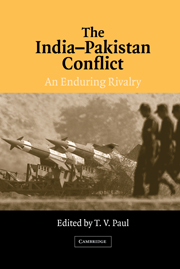Book contents
- Frontmatter
- Contents
- List of figures and tables
- Notes on contributors
- Acknowledgments
- Map: Jammu and Kashmir
- Part I Introduction
- Part II Theories of enduring rivalry and the South Asian conflict
- Part III Roots of the India–Pakistan conflict
- 6 Major powers and the persistence of the India–Pakistan conflict
- 7 Nuclear weapons and the prolongation of the India–Pakistan rivalry
- 8 National identities and the India–Pakistan conflict
- 9 At the heart of the conflict: irredentism and Kashmir
- 10 Institutional causes of the India–Pakistan rivalry
- Part IV Conclusion
- Index
8 - National identities and the India–Pakistan conflict
Published online by Cambridge University Press: 30 November 2009
- Frontmatter
- Contents
- List of figures and tables
- Notes on contributors
- Acknowledgments
- Map: Jammu and Kashmir
- Part I Introduction
- Part II Theories of enduring rivalry and the South Asian conflict
- Part III Roots of the India–Pakistan conflict
- 6 Major powers and the persistence of the India–Pakistan conflict
- 7 Nuclear weapons and the prolongation of the India–Pakistan rivalry
- 8 National identities and the India–Pakistan conflict
- 9 At the heart of the conflict: irredentism and Kashmir
- 10 Institutional causes of the India–Pakistan rivalry
- Part IV Conclusion
- Index
Summary
Introduction
Enduring rivalries pose particularly interesting theoretical questions for both international relations and comparative politics. Here it is not only the causes of the conflict that matter, but also the reasons for their persistence. These conflicts tend to have both deeper roots in and more directly impact domestic politics. In fact, neither the persistence nor the ultimate resolution of these rivalries can be explained without taking domestic political factors into consideration.
The case of Pakistan–India rivalry sheds much light on the dynamics of enduring rivalries, more so because it involves the question of identity. Identity here refers not only to ethnic or linguistic attachments, but more to how the nature of politics, purpose of the state, and its underlying values and interests are understood by key political actors and their respective constituencies. These notions can be defined in terms of overarching worldviews that are drawn from a religion or political ideology. The Pakistan–India rivalry in particular has involved questions of national identity – in fact, it has helped forge and change those identities on both sides. The rise of Islamism and Hindu nationalism and their role in shaping state ideology and national identities in Pakistan and India has played an important role in the endurance of the rivalry between the two countries. However, what is not immediately clear is if the impact of religious identity has been the same in the two countries, and if that impact has entrenched and intensified the rivalry.
- Type
- Chapter
- Information
- The India-Pakistan ConflictAn Enduring Rivalry, pp. 178 - 201Publisher: Cambridge University PressPrint publication year: 2005
- 15
- Cited by

